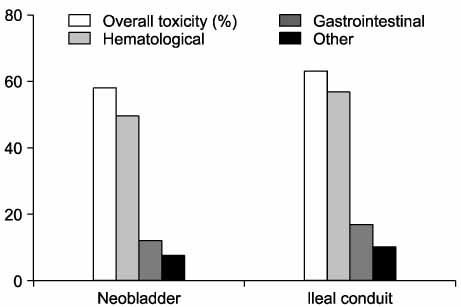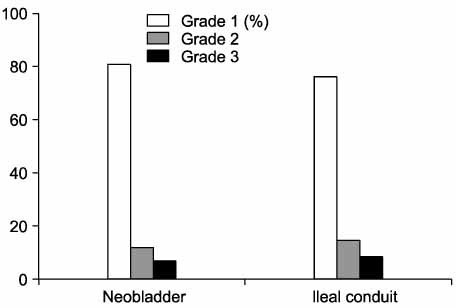Korean J Urol.
2007 Nov;48(11):1116-1120. 10.4111/kju.2007.48.11.1116.
Safety of Adjuvant Chemotherapy after Orthotopic Bladder Substitution: Comparison to Ileal Conduit
- Affiliations
-
- 1Department of Urology, Seoul National University College of Medicine, Seoul, Korea. eslee@snu.ac.kr
- KMID: 1997086
- DOI: http://doi.org/10.4111/kju.2007.48.11.1116
Abstract
-
PURPOSE: Radical cystectomy with urinary tract reconstruction currently remains the standard treatment for invasive bladder cancer, and adjuvant chemotherapy is usually considered for patients with a clinical stage >T2 or nodal metastasis. The aim of this study was to assess the safety of adjuvant chemotherapy in patients with orthotopic bladder substitution in comparison to ileal conduit.
MATERIALS AND METHODS
We retrospectively analyzed the patients who underwent radical cystectomy and urinary diversion between 1990 and 2005. The patients who underwent adjuvant chemotherapy were stratified into two groups: those who had orthotopic bladder substitution and those who had ileal conduit. The chemotherapy regimen, renal function change, complications from adjuvant chemotherapy and other relevant data were analyzed.
RESULTS
Overall, 341 patients had radical cystectomy, 89 had adjuvant chemotherapy, 28 had orthotopic bladder substitution and 61 had ileal conduit. The patient characteristics, including age, stage and follow-up, were similar in both groups. In all, 42% of patients had grade 1 toxicity, 16% had grade 2, 14% had grade 3 and 0% had grade 4. No patients had serious organ toxicity and none died. There were no significant differences in the chemotherapy toxicity and renal function change among the two groups.
CONCLUSIONS
Adjuvant chemotherapy is safe and well tolerated by patients with either orthotopic bladder substitution or ileal conduit. There was no increased morbidity or mortality due to adjuvant chemotherapy in the patients who had orthotopic bladder substitution. Hence, orthotopic bladder substitution should not be denied to those patients with bladder cancer and who might require adjuvant chemotherapy.
MeSH Terms
Figure
Reference
-
1. Hautmann RE, Simon J. Ileal neobladder and local recurrence of bladder cancer: patterns of failure and impact on function in men. J Urol. 1999. 162:1963–1966.2. Stein JP, Skinner D. Wein AJ, Kavoussi LR, Novick AC, Partin AW, Peters CA, editors. Orthotopic urinary diversion. Campbell-Walsh urology. 2007. 9th ed. Philadelphia: Saunders;2613–2648.3. Parekh DJ, Gilbert WB, Koch MO, Smith JA Jr. Continent urinary reconstruction versus ileal conduit: a contemporary single-institution comparison of perioperative morbidity and mortality. Urology. 2000. 55:852–855.4. Dutta SC, Chang SC, Coffey CS, Smith JA Jr, Jack G, Cookson MS. Health related quality of life assessment after radical cystectomy: comparison of ileal conduit with continent orthotopic neobladder. J Urol. 2002. 168:164–167.5. Skinner DG, Daniels JR, Russell CA, Lieskovsky G, Boyd SD, Nichols P, et al. The role of adjuvant chemotherapy following cystectomy for invasive bladder cancer: a prospective comparative trial. J Urol. 1991. 145:459–464.6. Freiha F, Reese J, Torti FM. A randomized trial of radical cystectomy versus radical cystectomy plus cisplatin, vinblastine and methotrexate chemotherapy for muscle invasive bladder cancer. J Urol. 1996. 155:495–499.7. Herr HW. Does current chemotherapy improve survival of patients with invasive bladder cancer? Urology. 1997. 49:309–312.8. Manoharan M, Reyes MA, Kava BR, Singal R, Kim SS, Soloway MS. Is adjuvant chemotherapy for bladder cancer safer in patients with an ileal conduit than a neobladder? BJU Int. 2005. 96:1286–1289.9. Lippert MC, Theodorescu D. The Hautmann neobladder with a chimney: a versatile modification. J Urol. 1997. 158:1510–1512.10. Studer UE, Ackermann D, Casanova GA, Zingg EJ. Three years' experience with an ileal low pressure bladder substitute. Br J Urol. 1989. 63:43–52.11. Bricker EM. Bladder substitution after pelvic evisceration. Surg Clin North Am. 1950. 30:1511–1521.12. Common toxicity criteria manual. National Cancer Institute. Washington DC: Available from http://ctep.cancer.gov/reporting/CTC-3.html.13. Chester JD, Hall GD, Forster M, Protheroe AS. Systemic chemotherapy for patients with bladder cancer - current controversies and future directions. Cancer Treat Rev. 2004. 30:343–358.14. Stockle M, Meyenburg W, Wellek S, Voges GE, Rossmann M, Gertenbach U, et al. Adjuvant polychemotherapy of nonorgan-confined bladder cancer after radical cystectomy revisited: long-term results of a controlled prospective study and further clinical experience. J Urol. 1995. 153:47–52.15. Michael M, Tannock IF, Czaykowski PM, Moore MJ. Adjuvant chemotherapy for high-risk urothelial transitional cell carcinoma: the Princess Margaret Hospital experience. Br J Urol. 1998. 82:366–372.16. Suzuki S, Shinohara N, Harabayashi T, Sato S, Abe T, Koyanagi T. Impact of adjuvant systemic chemotherapy on postoperative survival in patients with high-risk urothelial cancer. Int J Urol. 2004. 11:456–460.17. Kaufman D, Raghavan D, Carducci M, Levine EG, Murphy B, Aisner J, et al. Phase II trial of gemcitabine plus cisplatin in patients with metastatic urothelial cancer. J Clin Oncol. 2000. 18:1921–1927.18. von der Maase H, Hansen SW, Roberts JT, Dogliotti L, Oliver T, Moore MJ, et al. Gemcitabine and cisplatin versus methotrexate, vinblastine, doxorubicin, and cisplatin in advanced or metastatic bladder cancer: results of a large, randomized, multinational, multicenter, phase III study. J Clin Oncol. 2000. 18:3068–3077.19. Yoon DJ, Chang SG. Efficacy and toxicity of gemcitabine based chemotherapy for advanced urothelial cancer. Korean J Urol. 2002. 43:7–13.20. Kock NG, Nilson AE, Norlen LJ, Sundin T, Trasi H. Urinary diversion via a continent ileum reservior. Clinical experience. Scand J Urol Nephrol. 1978. 49:Suppl. 23–31.21. Skinner DG, Boyd SD, Lieskovsky G. Clinical experience with the Kock continent ileal reservoir for urinary diversion. J Urol. 1984. 132:1101–1107.22. Marshall FF. Creation of ileocolic bladder after cystectomy. J Urol. 1988. 139:1264–1268.23. Hautmann RE, Egghart G, Frohneberg D, Miller K. The ileal neobladder. J Urol. 1988. 139:39–42.24. Broderick GA, Stone AR, deVere White R. Neobladders: clinical management and considerations for patients receiving chemotherapy. Semin Oncol. 1990. 17:598–605.25. Wire PD, Dupuis RE, Mohler JL, Bernard SA, Lindley CM. Methotrexate elimination in a patient with an orthotopic neobladder with and without a urethral catheter. Pharmacotherapy. 1996. 16:961–964.26. Meliani E, Lapini A, Serni S, Corvino C, Carini M. Gemcitabine plus cisplatin in adjuvant regimen for bladder cancer. Toxicity evaluation. Urol Int. 2003. 71:37–40.27. Jung JH, Lee SH, Kim HW, Cho SY, Kim SW, Lee CH, et al. Efficacy and toxicity of gemcitabine plus cisplatin chemotherapy in advanced urothelial cancer. Korean J Urol. 2003. 44:739–744.
- Full Text Links
- Actions
-
Cited
- CITED
-
- Close
- Share
- Similar articles
-
- Functional Outcomes and Quality of Life after Orthotopic Bladder Substitution in Bladder Cancer Patients
- Urinary Diversion: Ileal Conduit to Orthotopic Neobladder Substitution
- The experience of the bladder augmentation and substitution with Studer's ileal cup-patched bladder
- Comparison of the Complications and Urodynamic Parameters for Orthotopic Bladder Substitution with using Ileocolic or Ileal Segments after Radical Cystectomy
- Quality of Life in Different Type of Urinary Diversion after Radical Cystectomy



